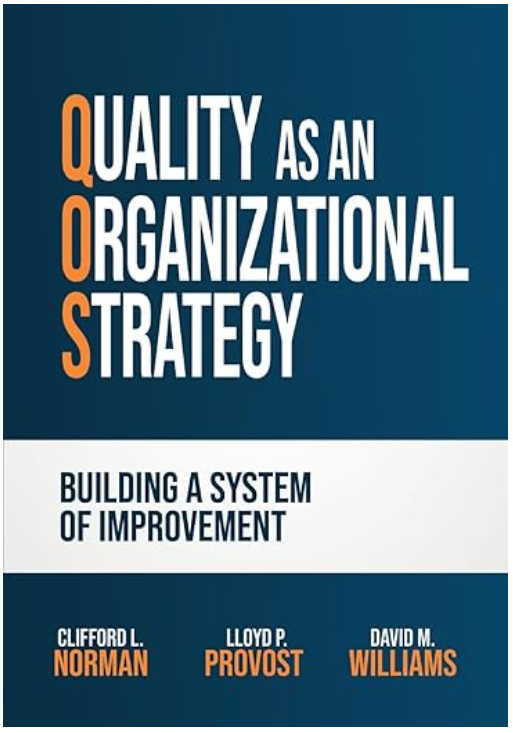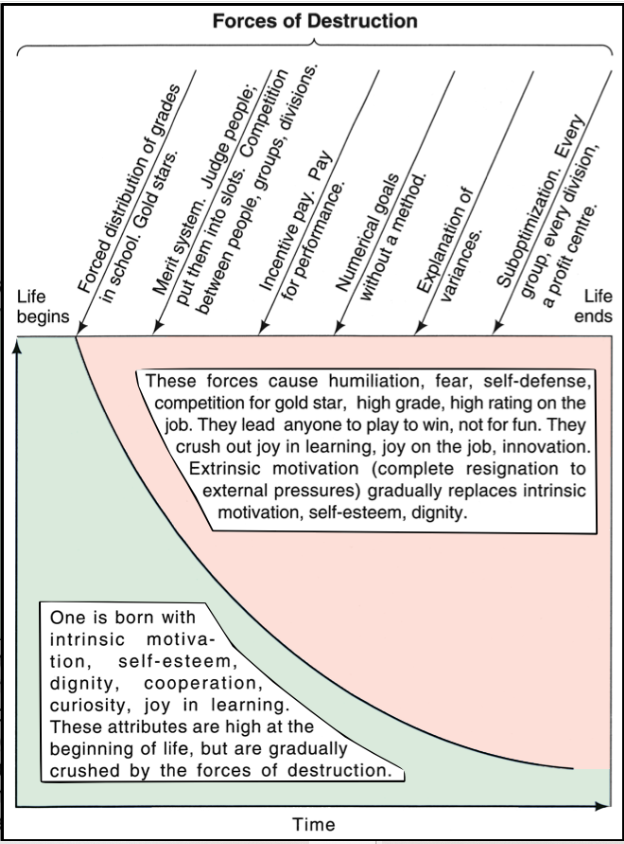“When an employee applies to your organization and shows up on their first day, they are hoping this is their dream job, that “this is the one.”
Six months later when they do not show that same enthusiasm, engagement and intrigue; that is what your organization did to them over time.
They showed you their true selves when they show up to interview.
This is so unfortunate, that folks cannot look to work as being something to enjoy.
I think, especially the more since I have been involved in thinking about quality as an organizational strategy:
Any type of business or organization can be a joyful place to work for the right people:
It just needs to be a place that is focused on enabling people to do their best work in the right way: In the direction of serving their clients and customers.
I think that is the value anywhere.”
Dave Williams, author of:

Williams goes on to talk about the Forces of Destruction that Deming talks about in Out of the Crisis.
The Forces of Destruction:
These are the accrued effects of a life sentence spent in pursuit of rewards, from grades and gold stars when we are young, to winner-take-all competitive contests, incentives, and merit appraisals when we are adults.
They are the unique creation of what Dr. Deming called the “tyranny of the prevailing style of interaction between people, between teams, between divisions” – a feature of modern management theory and thinking on how people are best organized and led that inculcates all of our institutions and organizations, public and private.
The prevailing forces of destruction start early in life: With grades in school from toddler on up through the university, gold stars for school athletics, merit system or annual appraisal on the job, incentive pay, work standards, MBO (rather, MBIR: Management by Imposition of Results), MBR (Management by Results). These forces of destruction must be replaced by leadership.
What the forces of destruction do is to squeeze out from an individual, over his lifetime, his innate intrinsic motivation, self-esteem, dignity. They build into him fear, self-defense, extrinsic motivation. We have been destroying our people, from toddlers on through university, and on the job. We must preserve the power of intrinsic motivation, dignity, cooperation, curiosity, joy in learning, that people are born with.

Dr. Deming diagnosed these forces as the prevailing system of management working as designed to gradually rob people of their positive traits like curiosity, enthusiasm for learning, and cooperation and replacing them with defensiveness, fear, humiliation, and adversarial “I win, you lose” competition as a universal solvent.
Arbitrary targets are assigned without any means or explanation of how to achieve them. Pride and joy in work becomes diminished and compensated with cheap gestures and inducements to overlook deficiencies in leadership’s understanding of their obligations to improve.
Once you understand these forces, you can see them at play almost everywhere…
According to Deming:
The only way to reverse the decline the Forces of Destruction set in motion is through transformation of the whole system of management rather than reformation of its parts which would leave the root causes untouched.
As Deming said in the New Economics (page 85):
The transformation will take us to a new method of reward. We must restore the individual, and do so in the complexities of interaction with the rest of the world. Transformation will release the power of human resource contained in intrinsic motivation. In place of competition for high rating, high grades, to be Number One, there will be cooperation on problems of common interest between people, divisions, companies, competitors, governments, countries. The result will in time be greater innovation, applied science, technology, expansion of market, greater service, greater material reward for everyone. There will be joy in work, joy in learning. Anyone who enjoys his work is a pleasure to work with. Everyone will win; no losers.
- Are you able to imagine a radically different future state?
- Can you approach change systematically rather than looking for a silver bullet?
- Will you be able to persevere over the next 3-5 years making the change irreversible?


Leave a Reply